The Heart of Serbia
THROUGH KOSOVO, LENGTHWISE AND CROSSWISE (1)
Awaiting the Great Wait
”It is not our first time, my son. They will do their thing, it is up to us to do ours. Another Serbian Great Wait is awaiting us. Last time we waited for almost four centuries, but it came. Then, we used to be a nation that knows how to wait. Now everything became faster and more confusing, the Great Wait will be ten or a hundred times shorter. However, are we still a nation that has the wisdom and strength for the Great Wait? Everything, my son, now depends on that. Everything.”
By: Branislav Matić
”Holy Duke and Great Martyr, may your powerful and righteous sword watch over this valley and over us, sinful and unworthy. You, who have always been the last defense, help us now to defend this land of the cross, this land holy and crucified, this land better than us to whom it was given for safekeeping. Protect this city carrying Your name as you have been protecting us for sixteen centuries, your city of birth. You, who have always helped us when it was most difficult, know best that this moment has just come. Raise the strongest rampart of defense in my little heart.”
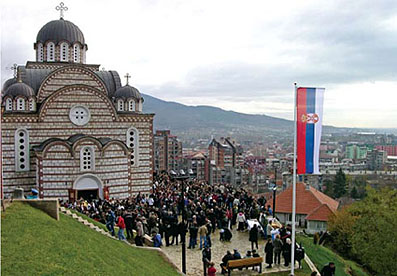 Mitrovica, St. Demetrius’ day. Kosovska Mitrovica. A day solemn and gentle, filled with prayer, loud and silent, and hope. Nowhere in the world does hope have such a heroic echo as today in Kosovo. Mitrovica, St. Demetrius’ day. Kosovska Mitrovica. A day solemn and gentle, filled with prayer, loud and silent, and hope. Nowhere in the world does hope have such a heroic echo as today in Kosovo.
The new temple in this part of Kosovska Mitrovica north of the river Ibar, which remained under Serbian control after the UN forces entered in the summer of 1999, was built in 2005, and dedicated to the holy martyr Demetrius, protector of his birthplace Thessalonica, Siberia and Mitrovica. It is located on the hill above the city, dominating, visible from all sides, especially when one looks up. It is powerful in its reduced beauty, worthy of the place it sprouted from and the heavens towards which it grows. Above it is only the medieval town of Zvečan, guardian of the road and guardian of the dream.
The old Mitrovica Orthodox temple, dedicated to St. Sava, remained in the southern part of the town, alone and besieged, ”available to the Serbs only in armored vehicles (which haven’t arrived yet)”.
The procession circles around the temple on the hill three times, symbolically, and goes down to the city. Lots of people, mostly young people and children. Their brave merriness, their enchanting innocence, seemingly the same as anywhere else in this world, here are touching, provoking tears, provoking pain. It is obvious, these precocious heroes know everything, they are aware of everything, yet they laugh! On the city panorama, several skyscrapers stick out, painfully incising the glance with horribly loud colors, inappropriate even for a teenage girl’s dress, let alone a building in which people live.
”Who colored those buildings like that?”
”It is on the other side of the river. For the time being, don’t ask us about it.”
A SPARK ON THE CHEEK 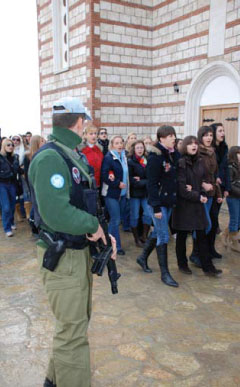 After passing streets which, with their arrangement, represent a piece of a different town and a past life, the procession reaches the, also full, Šumadija Square. There, on the small square, better to say crossroad, on the day of St. Demetrius, unveiled was the monument to Grigori Stepanovich Shcherbina (1868-1903), famous Russian Consul in Mitrovica a little bit more than a century ago, in times difficult at least as the present ones. He passed away in 1903, at the age of 35, shortly after he was traitorously attacked by an Albanian. The Serbian Minister for Kosovo and Metohija Slobodan Samardžić and the Ambassador of Russia in Serbia Alexander Alexeyev arrived to the celebration of the saint day of Mitrovica and unveiling of the monument to Shcherbina. The atmosphere on the square is solemn without any EUphoria. A gathering of people calm in their hearts and resolved, in spite of everything. After passing streets which, with their arrangement, represent a piece of a different town and a past life, the procession reaches the, also full, Šumadija Square. There, on the small square, better to say crossroad, on the day of St. Demetrius, unveiled was the monument to Grigori Stepanovich Shcherbina (1868-1903), famous Russian Consul in Mitrovica a little bit more than a century ago, in times difficult at least as the present ones. He passed away in 1903, at the age of 35, shortly after he was traitorously attacked by an Albanian. The Serbian Minister for Kosovo and Metohija Slobodan Samardžić and the Ambassador of Russia in Serbia Alexander Alexeyev arrived to the celebration of the saint day of Mitrovica and unveiling of the monument to Shcherbina. The atmosphere on the square is solemn without any EUphoria. A gathering of people calm in their hearts and resolved, in spite of everything.
In the mass, seeing the Serbian state delegation led by Minister Samardžić arrive, a tall old man near us, with long epic moustache, couldn’t withstand: he dropped a tear of joy, a tear of sorrow, a tear of defiance. Is it worth to explain this unwiped, this proud and defiant tear to a provincial cynic far from here, who has just had a vision of this tear entering his consumer’s basket, devouring his favorite sweets, sneaking into his passport and irreversibly deleting his Schengen multiple visa, blackening his verified white characteristics of ”political correctness”? Is it worth to explain him the difference between his superficial ”rationality” and this spark on the cheek, mature, proud, pathetic (divine)?
That small sign of the presence of Serbia, represented by a minister and a delegation, here, at the Šumadija Square in Kosovska Mitrovica, on St. Demetrius’ day, stirringly indicates that ”we still exist, that we are people among people and a nation among nations, that we are here”.
WE WORRY AND FIGHT 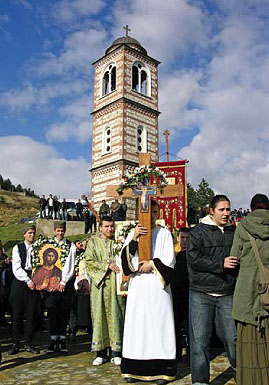 ”Since I was appointed Minister for Kosovo and Metohija, I never had a bigger honor and bigger pleasure than this: to, together with Ambassador Alexeyev, unveil the monument to the Russian Consul Grigori Stepanovich Shcherbina”, said Slobodan Samardžić. ”That monument is an important reminder of the past, which was the same as our present time. What happened in 1902 and 1903, when Shcherbina was supposed to come to this area and defend the Serbian people – as we can see – is being repeated. As if history has given us that hard fate to constantly fear for our lives, for our property, for our state. There, a century later, remembering this hero, we are worried for our present and our future. However, we worry and we fight! And we have the strength, and we have friends. Our biggest friend in this battle of ours is Russia. Just like Shcherbina came in 1903 to report about the fate of the Serbian nation, about how it lives and how it suffers, today we have here, in Mitrovica, Ambassador Alexeyev to report about how the Serbs live, how they remember their friends and how they respect them. Then, in 1903, there was terrible violence and many oppressors of the Serbian people. Today they are called differently: terrorists. They exist throughout Kosovo and Metohija, everyone knows who they are, everyone knows where they are, only some don’t want to identify them. ”Since I was appointed Minister for Kosovo and Metohija, I never had a bigger honor and bigger pleasure than this: to, together with Ambassador Alexeyev, unveil the monument to the Russian Consul Grigori Stepanovich Shcherbina”, said Slobodan Samardžić. ”That monument is an important reminder of the past, which was the same as our present time. What happened in 1902 and 1903, when Shcherbina was supposed to come to this area and defend the Serbian people – as we can see – is being repeated. As if history has given us that hard fate to constantly fear for our lives, for our property, for our state. There, a century later, remembering this hero, we are worried for our present and our future. However, we worry and we fight! And we have the strength, and we have friends. Our biggest friend in this battle of ours is Russia. Just like Shcherbina came in 1903 to report about the fate of the Serbian nation, about how it lives and how it suffers, today we have here, in Mitrovica, Ambassador Alexeyev to report about how the Serbs live, how they remember their friends and how they respect them. Then, in 1903, there was terrible violence and many oppressors of the Serbian people. Today they are called differently: terrorists. They exist throughout Kosovo and Metohija, everyone knows who they are, everyone knows where they are, only some don’t want to identify them.
It is up to us to point out: just like there were oppressors in the past, there are terrorists now. They are very well organized, not only in Kosovo and Metohija. It is up to us state: we will fight against the terrorists, against all those who endanger our freedom and our state. And we will attempt to gather as many friends in the whole world as possible to do that. When I say we, I mean Serbia and Russia, because we officially call our politics for K&M: ‘joint politics for K&M’.”
Standing before the monument to the one who laid down his life in Mitrovica 104 years ago as a Russian Consul, the present Russian Ambassador in Serbia, His Excellency Alexander Alexeyev said:
”I am very glad, it is my honor and I am touched because I am together with you in this symbolically important event. It is of great significance for all of us. Today, it is once again confirmed: in all great historical turns, always when it is difficult and when danger is enormous, we must be together. My friend Minister Samardžić is right: we came to the joint politics for Kosovo. Russia does not support the Serbian politics in Kosovo; it considers this politics its own, a joint one.”
THROUGH FLAT KOSOVO 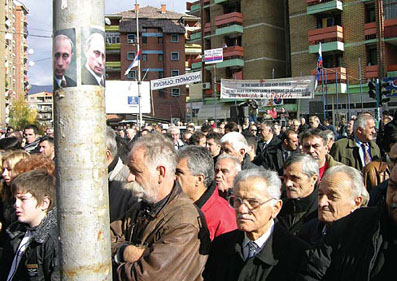 In the morning, about two hundred meters from the second Mitrovica bridge on the Ibar, we put the plates issued by the international police in Kosovo and Metohija on our car, the so-called Kosovo plates, and cross the river. We travel without escort, with a private car, at our own risk. Through the gloomy, dirty streets, in the gray November morning, we pass through the southern part of the city under Albanian control. The industrial zone is dead, no trace of activity, production, as if on some pre-technological graveyard from the XIX century. Only trade, large and small, black, gray, whatever. Dust and live flesh, drugs, people. And services. Of all colors. Everything is possible and nothing is possible. Depends. In the morning, about two hundred meters from the second Mitrovica bridge on the Ibar, we put the plates issued by the international police in Kosovo and Metohija on our car, the so-called Kosovo plates, and cross the river. We travel without escort, with a private car, at our own risk. Through the gloomy, dirty streets, in the gray November morning, we pass through the southern part of the city under Albanian control. The industrial zone is dead, no trace of activity, production, as if on some pre-technological graveyard from the XIX century. Only trade, large and small, black, gray, whatever. Dust and live flesh, drugs, people. And services. Of all colors. Everything is possible and nothing is possible. Depends.
We go out to the road towards Vučitrn and Priština. That real ”flat Kosovo” from the songs opens before us. The road, maintained by the international administration, is decent. Everywhere are billboards, posters, political graffiti. The Shqip electoral circus has reached its culmination. Old acquaintances. They are all there. Even the late Rugova is taking part at the elections. The old, strenuously and clumsily exercised smiles, ”Latin” and ”American”. The gentility of the cold-blooded murderer. The mafia boss playing saint. A sage-like expression on the face of the one hastily released from The Hague to ennoble the political process and strengthen the understanding between the nations in the mono-national Kosovo.
Beget Pezoli, that ”Shqip Karić” who owns one of the strongest networks of gas stations in Serbia (”That is what our battle has given us”), promises the Kosovo Shqips (from an enormous number of billboards) ”A new beginning” with money earned in such a way. Poetical enough for a slogan and universe-like enough for Kosovo. Veton Suroi, the owner of the Koha Ditore daily, highly ranked in the US parapolitical structures, went furthest. He put his picture with George Bush on the billboard. Impersonal and overdesigned, although, to be honest, he didn’t add any hair. The joke is in the fact that they copied him the same necktie Bush is wearing. The two of them are standing, holding hands, with a same smile, with the same neckties, wanting to unconditionally give joy to the world with the same passion. One locally, the other globally.
THE GREAT DUMP IN THE MONEY LAUNDRY 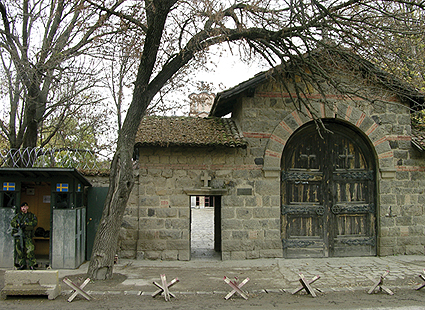 Routine control on the road. A black man. We cannot see the mark on his sleeve. Communication in English. He is polite. Nothing special. Routine control on the road. A black man. We cannot see the mark on his sleeve. Communication in English. He is polite. Nothing special.
We continue.
It is clear at first glance to a traveler with any kind of previous knowledge: the present Kosovo, created under the UN protectorate, is one of the biggest laundries of dirty and bloody money in the world.
There is no production, nor legal export; the elementary things of the economy and public sector are not functioning and construction in blossoming. Unreasonably large and overexpensive houses, with an unclear purpose, sprout everywhere. By the roads, in the mayhalas, in the fields. An unbelievable urge to make depots of houses, instead of arranged settlements!
However, despite the big money which obviously entered here, some things – with seemingly too deep roots in the mental and psychological structure – haven’t changed for the better. On the contrary. By the Vučitrn-Priština road stands an almost continuous dump. Next to the one million euros worth houses, again dumps, like in slums. The dumps have spread to fields, hills, everywhere. (None of the electoral paroles promise to radically clean Kosovo and make it decent. Since it was ethnically cleansed from the Serbs and all non-Shqips, other cleanings didn’t take place here. They don’t intend to either.)
We enter Priština somehow suddenly and unusually. The city looks as if it was doubled. According to the construction, the spreading, the number of the people newly arrived from somewhere, and the terrible crowds. ”The ballast of mentality”, that hardly digestible psychology of the casaba, interlaces with the Don Quixotian (or completely insincere) attempts of the international administration to Europize the city. Assuming that this is not stupid hypocrisy, those with a wish to Europize reject to understand that this is a place where, in present Europe, European values are most jeopardized. They didn’t even understand the most essential thing of the Kosmet conflict. It is, basically, not only a conflict of two or more national programs, but, before all, two types of human beings, two value systems and points of view, a conflict of the millennium culture and millennium lack of culture, irreconcilable as much as they have been centuries before. ”You cannot ‘teach the darkness to glow’ by rewarding barbarism, or retreating before it.”
From the skyscraper in the Priština downtown, in the boulevard bestowed to him by the ones to whom he bestowed Kosovo, waves William Clinton. As we turn towards Gračanica, it becomes clear to us that Priština is actually rapidly expanding towards that side. Perhaps it is formulated as a plan: that Priština shall merge with Gračanica and swallow one of the most significant remaining Serbian strongholds in Kosovo.
APOLOGY FOR THE CATASTROPHES An ordinary day in Gračanica among days in complete and literally hostile surroundings. People pass by, attend their business, quickly and without joy. There is no loud talking, there is no laughter and no usual liveliness. ”No one begins anything big, because you never know what will happen tomorrow”, tells us the owner of a Serbian restaurant across the street from the Monastery. And adds the almost obligatory remark here: ”Don’t mention names. No reason to explain why.”
At the entrance of the ancient beautiful temple (from 1313) stand guards. Swedes. Polite, but reserved. They constantly watch the highway passing through the very center of Gračanica, immediately by the temple yard. The yard is encircled with a high wall, and long twisting barbwire is the top of the wall. Since the control points in the entrances/exits were removed, according to the unexplained order of the international administration, the safety of the Gračanica population and Monastery drastically dropped. For example, it is very easy to perform an armed attack from a moving vehicle, even a bomb attack.
His Grace Bishop of Raška and Prizren Artemije, who has his temporary seat in Gračanica since the pogrom in Prizren in 2004, politely receives the representative of the National Review. He is happy to see the magazine, he is interested in everything. He contemplates deeply about everything, skipping ”bad scenarios” and without missing to learn on everyone’s mistakes. Too often and too painfully was he able to confirm how empty the apologies of the ”international community” are, after the permitted or even jointly organized catastrophes, although it was guaranteed that everything would be fine. Furthermore, too often was he able to see among the Serbs how those who think least, speak most, and how the most shaken ones for the fate of Kosovo are those who ran away fastest and furthest. ”We know the situation and now we don’t need such people, whether foreigners or ours”, repeats the bishop his warning. ”We need the highest level of wisdom, courage and responsibility.”
INCARNATION OF THE KOSOVO PAIN 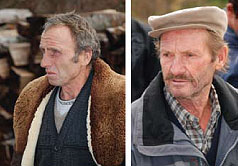 From Gračanica, on the road to Gnjilane, and then left towards Novo Brdo. In the village of Prekovce, we arrive to the consecration of the bakery and kitchen. Made from the donation funds, they will enable the survival of many people and small villages, to whom one unsafe forest path to this place is the only connection with the outside world and only possibility to eat. They are here today too, among them lots of old, alone, helpless people.Confronting these faces brings normal mature people to an emotional and spiritual shock. In their faces, one can see the Great Pain they carry and the GreatSuffering they overcome with life. Who hasn’t seen them, knows little of Kosovo. I really don’t know where anyone in Belgrade, or anywhere else, gets the idea that HE has the right to ” ”give Kosovo”, while these people are here, and while they, without complaining, silently, superhumanly, carry their Kosovo Pain.And when we turn off our devices and go our illusory ways, they will slowly, step by step, return to their Great Solitude. From Gračanica, on the road to Gnjilane, and then left towards Novo Brdo. In the village of Prekovce, we arrive to the consecration of the bakery and kitchen. Made from the donation funds, they will enable the survival of many people and small villages, to whom one unsafe forest path to this place is the only connection with the outside world and only possibility to eat. They are here today too, among them lots of old, alone, helpless people.Confronting these faces brings normal mature people to an emotional and spiritual shock. In their faces, one can see the Great Pain they carry and the GreatSuffering they overcome with life. Who hasn’t seen them, knows little of Kosovo. I really don’t know where anyone in Belgrade, or anywhere else, gets the idea that HE has the right to ” ”give Kosovo”, while these people are here, and while they, without complaining, silently, superhumanly, carry their Kosovo Pain.And when we turn off our devices and go our illusory ways, they will slowly, step by step, return to their Great Solitude.
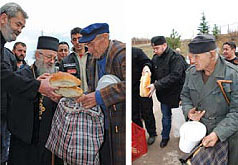 ”It is not our first time, my son”, tells us one of them, a seventy-three year old named Radomir.”They will do their thing, it is up to us to do ours. Another Serbian Great Wait is awaiting us. Last time we waited for almost four centuries, but it came. Then, we used to be a nation that knows how to wait. Now everything became faster and more confusing, the Great Wait will be ten or a hundred times shorter. However, are we still a nation that has the wisdom and strength for the Great Wait? Everything, my son, now depends on that. Everything.” ”It is not our first time, my son”, tells us one of them, a seventy-three year old named Radomir.”They will do their thing, it is up to us to do ours. Another Serbian Great Wait is awaiting us. Last time we waited for almost four centuries, but it came. Then, we used to be a nation that knows how to wait. Now everything became faster and more confusing, the Great Wait will be ten or a hundred times shorter. However, are we still a nation that has the wisdom and strength for the Great Wait? Everything, my son, now depends on that. Everything.” |
